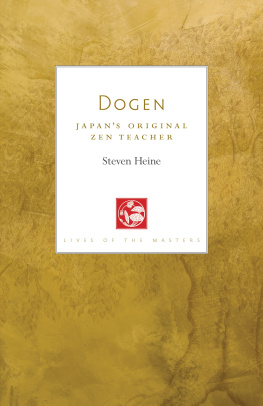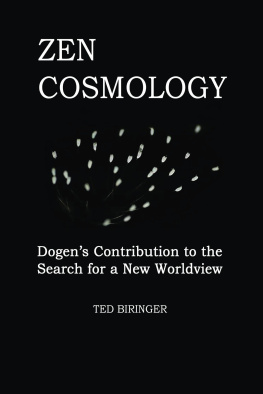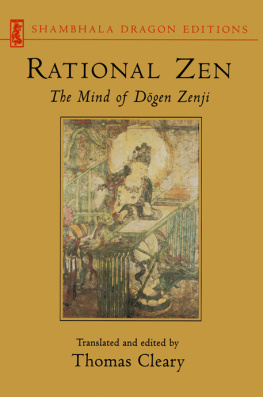The essence of Dgen
The essence of Dgen
Masanobu Takahashi
Translated by Yuzuru Nobuoka
First published in 1983 by
Kegan Paul International
This edition first published in 2010 by
Routledge
2 Park Square, Milton Park, Abingdon, Oxon, OX 14 4RN
Simultaneously published in the USA and Canada
by Routledge
270 Madison Avenue, New York, NY 10016
Routledge is an imprint of the Taylor & Francis Group, an informa business
Mrs Nabuko Takahashi 1983
Transferred to Digital Printing 2010
All rights reserved. No part of this book may be reprinted or reproduced or utilised in any form or by any electronic, mechanical, or other means, now known or hereafter invented, including photocopying and recording, or in any information storage or retrieval system, without permission in writing from the publishers.
British Library Cataloguing in Publication Data
A catalogue record for this book is available from the British Library
ISBN 10: 0-7103-0046-8 (hbk)
ISBN 13: 978-0-7103-0046-1 (hbk)
Publishers Note
The publisher has gone to great lengths to ensure the quality of this reprint but points out that some imperfections in the original copies may be apparent. The publisher has made every effort to contact original copyright holders and would welcome correspondence from those they have been unable to trace.
Contents
Preface
This book is meant for the English reader who wishes to study the thought of Dgen, one of the greatest Zen Masters of Japans Middle Ages. Because of this objective, I mention in greater detail matters which may seem familiar or unnecessary for the Japanese reader. Especially for the academically oriented individual, I attempt to formulate a theoretical systematization of Dgens thought set into the cultural fabric of Japan.
This orientation towards a methodical ordering of Dgens thinking has been a constant concern from the earliest days of my study of this great Zen Master. The Structure of the Practical Ethics of Dgens Philosophy which I published at Sankib-Busshorin Tokyo, in 1967, was the result of a ten year study on this subject. In this work, I offered an essential systematization of Dgens thought. In 1978, I published another book, The Precepts of Dgen Their synthetic Interpretation, Ris-sha, Tokyo. This was the result of a more elaborate and deeper study covering the same ground. With this latter book, I believe that almost the entire structure of Dgens thought has been brought to light in a precise, theoretical analysis.
Now in this book, intended for the English speaking reader, I set out to explain Dgens thought in the light of my two previous studies as systematically as possible in concise, unequivocal language, while avoiding intricate, rambling explanations. I must add that I have not forgotten to add new insights drawn from my on-going studies. It has been a new discovery for me how the mysteries of Buddhism are at work at the deepest level of the Shbgenz, Dgens greatest and most important work of all. You will find this discussed in the theory of k (emptiness) and the material on a practical philosophy based on k found in .
I should also say that when considering the audience for this book, I made it a principle that the Chinese characters quoted here, for example, the names of books or persons as well as Chinese set phrases should be pronounced in the Japanese way. I think it better that any person who wishes to study Japanese culture become accustomed to the Japanese way of reading Chinese characters as soon as possible. The true significance of the Japanese classics, a product of a delicate and refined speculation will never be grasped thoroughly unless they are reviewed in their original language. It is expected that the student of Dgen should master Japanese and peruse the basic texts in the original language. The Supplement of this book is provided for such adventurous students.
I wish to express my profound thanks to Professor Yuzuru Nobuoka at Onomichi Junior College, Hiroshima for his careful and laborious work of translating my Japanese manuscript. I highly appreciate his linguistic ability as well as his wide knowledge of literature and religious philosophy, both oriental and occidental, which brought forth this faithful and lucid translation. I am heartily satisfied with the result.
My thanks also go to Professor Maureen OBrien of Notre Dame Seishin University, Okayama and Instructor Piers H. T. Dowding of Okayama College of Commerce, who in the process of translation cooperated with the translator by refining the English and offering many valuable suggestions.
Lastly I wish to acknowledge a particular debt to my friend, Dr Imahori Seiji, president of Hiroshima Womens College. Without his encouraging response to this book as it was being written and his kind offer to arrange things with the publisher for me, the publication of this book would have been impossible.
Dr Masanobu Takahashi
August 1981
Acknowledgments
I wish to acknowledge my debt of gratitude to the translators of the following works by Dgen; their skill made my task all that simpler. Shbgenz, vol. I, translated by Nishiyama Kosen and John Stevens, Daihokkaikaku, Tokyo, 1975. Shbgenz, vol. II, translated by Nishiyama Kosen and John Stevens, Nakayama-shob, Tokyo, 1977. The First Step to Dgens Zen Shbgenz-Zuimonki, translated by Yokoi Yh, Sankib-busshorin, Tokyo, 1972. Shbgenz-Zuimonki, translated by Kodani Teruo, a private press edition, Tottori, 1968. Dgens Formative Years in China An Historical Study and Annotated Translation of the Hky-ki, Takashi James Kodera, Routledge & Kegan Paul, London and Henley, 1980. The Bussh(Buddha-nature), section of the Shbgenz translated by Yokoi Yh, aBulletin of the Research Institute of Zen of Aichi-gakuin University, Nagoya, no. 8, 1977.
I also have to express my heartful thanks to Sr Maureen OBrien, Professor at Notre Dame Seishin University, Okayama, and Instructor Piers H. T. Dowding of Okayama College of Commerce who have not only looked over and corrected my translations but also given many useful suggestions. Without their help I could not have completed this difficult task.
In the translation of the titles of Dgens works, Buddhist and Zen terms, Chinese set phrases, and the like, I tried to express their true meaning as accurately as possible, evading the mere superficial word-byword rendition. I spent many hours with the author discussing the problems in order to find the most suitable English expression. According to the authors intention, I give Japanese personalities in Japanese fashion, that is, with the family name preceding the personal name.
The author has long cherished the wish of introducing Dgen to the West. I would be very pleased if my translation can fulfil the authors wish and make some contribution to the correct understanding by the West of this great Zen philosopher of Japan.
Yuzuru Nobuoka
August 1981
Chapter 1
Dgens life and his essential precepts
1 Dgens life
Dgen was born on 26 January in AD 1200 and died on 29 September in 1253. An outline of his 54 years of life is as follows. He was born into an aristocratic family and was related to the Emperor. His father was the Lord Keeper of the Privy Seal and his mother, the daughter of a certain Regent. But Dgen lost both parents early; the former when he was 3 years old; the latter when he was 8. After the loss of his parents he was brought up by a maternal uncle. His lot was not good as such but he was given an excellent education worthy of nobility. As he showed brilliant talent at an early age, he was considered to be a boy wonder. Observing his ability, his foster father intended preparing him for a successful career in officialdom, but Dgen wished to enter the Buddhist priesthood. At 14 years of age, he freely renounced the world. For about four years he devoted himself to the study of traditional Buddhism; at the age of 18, dissatisfied with this, he entered a monastery of the











